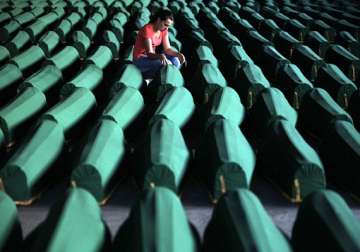Srebrenica (Bosnia), Jul 11: Thousands of people from around Bosnia and the world begun gathering in Potocari, near Srebrenica on Tuesday on the eve of the 17th anniversary of the killing of 8-thousand men and boys by Serb forces in 1995 in Srebrenica, the worst massacre of civilians on European soil since World War II.
The remains of 520 victims, exhumed from several mass graves around Srebrenica and recently identified using DNA analysis, will be buried on Wednesday at a memorial cemetery just outside the ill-fated eastern town alongside some 5-thousand other massacre victims that have already been buried there.
Several thousand people reached Srebrenica on Tuesday following three-day march through the hills of eastern Bosnia.
They had been retracing backwards the path some 15-thousand Bosniaks from Srebrenica took in 1995 in an attempt to escape from Serb forces.
Only about a third of original marchers survived the ordeal, while others had been hunted down by the Serbs and killed.
Some of the survivors, as well as Bosnia's international administrator Valentin Inzko also joined the commemorative march, organised each year to honour the killed Bosniaks.
“The oldest human right is a dignified burial and to have a memory of deceased and our dead relatives and this is why we came here to Srebrenica, to express solidarity with those who survived and with Srebrenica itself,” said Inzko, an Austrian diplomat.
Bikers from different Bosnian cities also reached Srebrenica a day before the anniversary and mass burial.
Bosnian Serb forces overran Srebrenica in July 1995, separated women, children and the elderly from men and then systematically murdered the men in mass executions before throwing their bodies into mass graves.
The bodies were excavated years ago but has always been challenging task identifying them as the perpetrators secretly dug up the original mass graves with bulldozers, then drove decomposing remains to other locations and buried them there.
The bloodbath was Europe's worst massacre since World War II and has been labelled a genocide by both the Yugoslav war crimes tribunal and the International Court of Justice.
Bosnian Serb military chief Ratko Mladic faces 11 charges, including genocide, for allegedly masterminding Serb atrocities throughout the war that culminated in the 1995 massacre of some 8-thousand Muslim men in Srebrenica.
Mladic is currently on trial at the Yugoslav war crimes tribunal at the Hague. He denies any wrongdoing.
Latest World News
